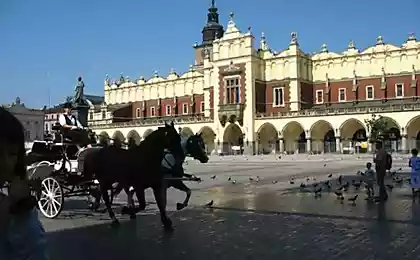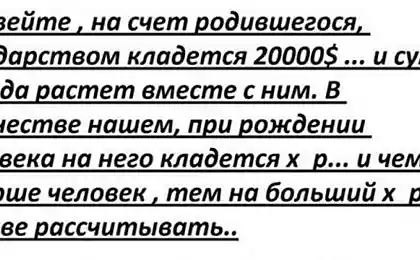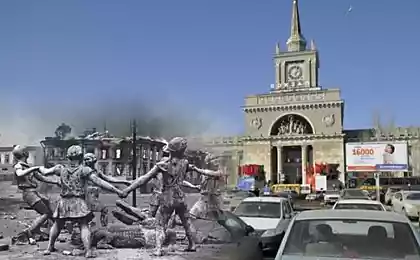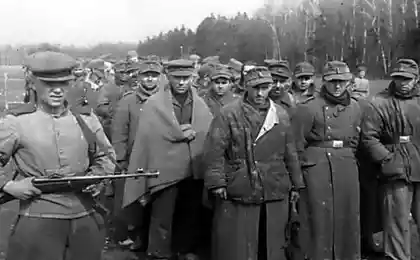608
Russian prisoners of war are buried in Poland ...
Russian prisoners of war are buried in Poland between the cement plant and sewage
Special investigation "Arguments and Facts»
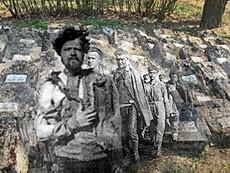
At the site of the former concentration camp prisoners to the Soviet-Polish war in 1919-1921. - Cement plant, near - sewerage. It is assumed that in mass graves in the forest buried 22,000 people. Even after 90 years, they do not know the rest ...
... "The camp in Tuchola - a dugout, which includes the steps going down. On both sides - the bunks where prisoners sleep. No Sennik, straw, blankets. No heat due to irregular supply of fuel. Tragically all conditions of the newcomers: they are transported in unheated trains without adequate clothing, people are cold, hungry and tired ... After such a journey of many sent to the hospital, and the weaker die. " This entry - an excerpt from the report of Natalia Kreutz-Velezhinskoy - representative of the Polish Red Cross. In December 1920, she visited a concentration camp for prisoners of war in Tuchola (town in the north of Poland), and was horrified by the conditions of the people. No wonder. If you believe the reports, aiming February 1, 1922 the Minister of War II Poland's Chief of the General Staff Department Lt. Col. Ignacy Matuszewski, only one this camp for a couple of years of starvation and disease killed 22 thousand (!) People of Soviet Russia ...
"Stumbles upon a pile of bones»
... Arriving in Tuchola, I looked for a long time that same cemetery. The city no one knows about it. First pointed to a monument to Polish soldiers at the church, then sent to the center, the obelisk with a star. Only the third time I was out of town on the edge of the forest, and ... yes, I see so did not expect. On the teeth crunching dust, the air shakes the roar of cement mixers, a neighborhood littered with piles of construction debris: on the site of the former concentration camp located near a cement factory. As told Polish journalist Malina Blanska, workers complain - until now, digging the earth, they stumble upon a pile of human bones. In the other side, about a hundred meters, - drainage, which blend the wastewater and sewage. Mass graves of deceased prisoners from the production of cement separates the flimsy fence; and authorities believe that this is normal.
- I do not understand what is there to be unhappy! - Zbigniew Kraetsky inspector Tuchola City Hall, answering my question, is nervous - he shake hands. - You just did not see the condition of the cemetery was only recently! The graves overgrown with weeds, gravestones scattered. We are now allocated to the maintenance of the place 7000 PLN (about 70 000 rubles. - Ed.) A year - have cleared, set the plate, put a wreath! Sewage next? They did not close! To us came the Russian ambassador, and he expressed no protest. Ban, what then is the matter ?!
Zbigniew hastily draws on a paper chart, proving to me that runoff from the sewage system should not be placed in the cemetery. As for "cement plant on the bones," he shrugs, "It was built in the seventies. Then, the Soviet authorities did not notice these graves - so as not to harm relations with Poland. A Poland of the more did not see ».
90 years ago they were kept worse than cattle
... The Soviet-Polish war broke out in 1919. After the departure of the Kaiser's army began to conquer lands Poles in Belarus and Ukraine: the aim was to "restore the borders of Poland in 1772," according to the plan of Jozef Pilsudski. Soon we upcoming set back - the Red Army moved to Warsaw. But the battle for the Polish capital ended in complete defeat for the Russian Federation and chaotic retreat. In the fall of 1920 in captivity were 65,000 Red Army soldiers, but only in the hands of the Poles turned out 130,000 soldiers of the Red Army. They were placed in a whole network of concentration camps - said in Tuchola, Strshalkovo, onion, Wadowice, Bialystok and Brest. The prisoners were almost no food, no health care: cold and epidemics did their job quickly. Report of hospital services Tucholsky camp testifies: "From February 1921 until May 11 of the same year registered 2,561 deaths in the three months killed at least 25% of the total number of prisoners detained in the camp" - people were dying of starvation, typhoid, frostbite. The corpses were buried in pits. Conditions in other camps were even worse. General Hordynsky-Yukhnovich who visited Bialystok, wrote in the report: "Russian prisoners covered with rags: pressed against each other, trying to get warm. In the air is the stench from dysentery and gangrene developing in the legs swollen from hunger. " In Brest camp were dying every day hundred of the Red Army, and the worst was the winter of 1920-1921 at the junction when frost killed thousands of camp dwellers. September 9, 1921 the People's Commissar of Foreign Affairs Chicherin Poland sent a note in which he accused the Polish authorities for the death of 60 thousand (!) Prisoners of war from the Russian Federation.
Before his death in a concentration camp of the Red Army went through a lot of horror and suffering.
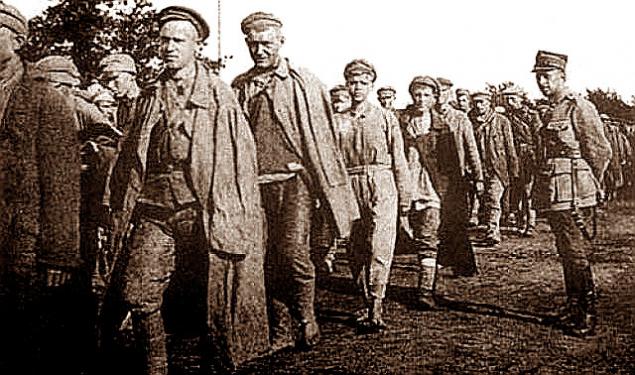
Source:
Special investigation "Arguments and Facts»

At the site of the former concentration camp prisoners to the Soviet-Polish war in 1919-1921. - Cement plant, near - sewerage. It is assumed that in mass graves in the forest buried 22,000 people. Even after 90 years, they do not know the rest ...
... "The camp in Tuchola - a dugout, which includes the steps going down. On both sides - the bunks where prisoners sleep. No Sennik, straw, blankets. No heat due to irregular supply of fuel. Tragically all conditions of the newcomers: they are transported in unheated trains without adequate clothing, people are cold, hungry and tired ... After such a journey of many sent to the hospital, and the weaker die. " This entry - an excerpt from the report of Natalia Kreutz-Velezhinskoy - representative of the Polish Red Cross. In December 1920, she visited a concentration camp for prisoners of war in Tuchola (town in the north of Poland), and was horrified by the conditions of the people. No wonder. If you believe the reports, aiming February 1, 1922 the Minister of War II Poland's Chief of the General Staff Department Lt. Col. Ignacy Matuszewski, only one this camp for a couple of years of starvation and disease killed 22 thousand (!) People of Soviet Russia ...
"Stumbles upon a pile of bones»
... Arriving in Tuchola, I looked for a long time that same cemetery. The city no one knows about it. First pointed to a monument to Polish soldiers at the church, then sent to the center, the obelisk with a star. Only the third time I was out of town on the edge of the forest, and ... yes, I see so did not expect. On the teeth crunching dust, the air shakes the roar of cement mixers, a neighborhood littered with piles of construction debris: on the site of the former concentration camp located near a cement factory. As told Polish journalist Malina Blanska, workers complain - until now, digging the earth, they stumble upon a pile of human bones. In the other side, about a hundred meters, - drainage, which blend the wastewater and sewage. Mass graves of deceased prisoners from the production of cement separates the flimsy fence; and authorities believe that this is normal.
- I do not understand what is there to be unhappy! - Zbigniew Kraetsky inspector Tuchola City Hall, answering my question, is nervous - he shake hands. - You just did not see the condition of the cemetery was only recently! The graves overgrown with weeds, gravestones scattered. We are now allocated to the maintenance of the place 7000 PLN (about 70 000 rubles. - Ed.) A year - have cleared, set the plate, put a wreath! Sewage next? They did not close! To us came the Russian ambassador, and he expressed no protest. Ban, what then is the matter ?!
Zbigniew hastily draws on a paper chart, proving to me that runoff from the sewage system should not be placed in the cemetery. As for "cement plant on the bones," he shrugs, "It was built in the seventies. Then, the Soviet authorities did not notice these graves - so as not to harm relations with Poland. A Poland of the more did not see ».
90 years ago they were kept worse than cattle
... The Soviet-Polish war broke out in 1919. After the departure of the Kaiser's army began to conquer lands Poles in Belarus and Ukraine: the aim was to "restore the borders of Poland in 1772," according to the plan of Jozef Pilsudski. Soon we upcoming set back - the Red Army moved to Warsaw. But the battle for the Polish capital ended in complete defeat for the Russian Federation and chaotic retreat. In the fall of 1920 in captivity were 65,000 Red Army soldiers, but only in the hands of the Poles turned out 130,000 soldiers of the Red Army. They were placed in a whole network of concentration camps - said in Tuchola, Strshalkovo, onion, Wadowice, Bialystok and Brest. The prisoners were almost no food, no health care: cold and epidemics did their job quickly. Report of hospital services Tucholsky camp testifies: "From February 1921 until May 11 of the same year registered 2,561 deaths in the three months killed at least 25% of the total number of prisoners detained in the camp" - people were dying of starvation, typhoid, frostbite. The corpses were buried in pits. Conditions in other camps were even worse. General Hordynsky-Yukhnovich who visited Bialystok, wrote in the report: "Russian prisoners covered with rags: pressed against each other, trying to get warm. In the air is the stench from dysentery and gangrene developing in the legs swollen from hunger. " In Brest camp were dying every day hundred of the Red Army, and the worst was the winter of 1920-1921 at the junction when frost killed thousands of camp dwellers. September 9, 1921 the People's Commissar of Foreign Affairs Chicherin Poland sent a note in which he accused the Polish authorities for the death of 60 thousand (!) Prisoners of war from the Russian Federation.
Before his death in a concentration camp of the Red Army went through a lot of horror and suffering.

Source:
